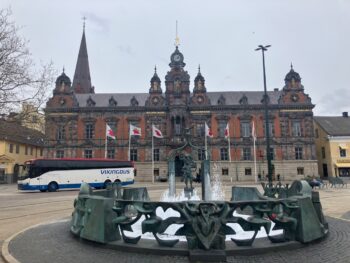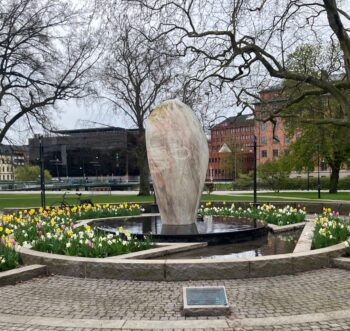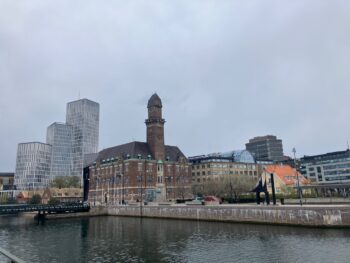We are developing the social individualist meta-context for the future. From the very serious to the extremely frivolous... lets see what is on the mind of the Samizdata people.
Samizdata, derived from Samizdat /n. - a system of clandestine publication of banned literature in the USSR [Russ.,= self-publishing house]
|
I have read that in the days when newspapers still used metal type, the compositors used to keep commonly used headlines ready-formed. The Bloomberg headline below would require only the substitution of the appropriate country name to work for anywhere in the world in any decade since governments came to vex mankind:
How Rent Controls Are Deepening the Dutch Housing Crisis
A law designed to make homes more affordable ended up aggravating an apartment shortage.
Two years ago, Nine Moraal and her two children moved into a one-bedroom flat near the Dutch city of Utrecht, a comfortable spot close to family and friends. Although she had only a two-year lease, she expected to be able to extend it and stay until she could get one of the Netherlands’ many rent-controlled apartments.
But last spring, her landlord told her she’d have to move out in November, because renting the flat was no longer profitable. Despite “frantic efforts on social media, phone calls, visits to realtors and housing agencies,” the 33-year-old educator says she hasn’t found anything. “The cost isn’t the problem, but a real shortage of housing is.”
Moraal is among the growing number of Dutch people struggling to find a rental property after a new law designed to make homes more affordable ended up aggravating a housing shortage. Aiming to protect low-income tenants, the government in July imposed rent controls on thousands of homes, introducing a system of rating properties based on factors such as condition, size and energy efficiency. The Affordable Rent Act introduced rent controls on 300,000 units, moving them out of the unregulated market.
[…]
ASR Nederland NV, which owns about 15,000 apartments across the country, has called on the government to rethink the measure. Almost its entire portfolio was shifted into the regulated segment on July 1, spurring it to abandon plans to purchase more rental properties, says Jos Baeten, ASR’s chief executive officer. “There are other investment categories that are more appropriate,” he says.
One provision of the law bars short-term leases, instead requiring all contracts to be open-ended. Some in the industry suggest the change will encourage landlords to prioritize foreigners, who are more likely to move away after a few years, giving owners more flexibility.
Emphasis added. That’ll go down well with the PVV, currently the largest party in the Dutch House of Representatives.
I came across this Substack essay by someone called Mick Ryan about the Ukrainian invasion of the Kursk region of Russia, a move that seems to have taken Moscow completely by surprise:
This Ukrainian operation represents a very significant effort on the part of the Ukrainians to reset the status quo in the war, and change narratives about Ukraine prospects in this war.
It is the kind of strategic risk-taking that I don’t think is well understood in many Western capitals anymore. For nearly two generations now, Western nations have been able to cut military spending. None of them have faced existential threats, even though the War on Terror did require a significant response for more than a decade after 9/11.
The slow decision-making cycles in Western military and political circles, and in military procurement, is indicative of institutions that no longer understand the imperative to act quickly and decisively while taking major risks.
This is not the case for the Ukrainians. They have faced an existential threat since February 2022 (and more broadly, for the entirety of their existence as a people) and have a very different political and military decision-making calculus than those of their supporters. A nation and a people who face an existential risk from their neighbour tend to think differently from those who do not.
“Flashback: Harris fumed at Americans for saying ‘Merry Christmas’ before illegal migrants got protections”, Fox News reports:
Then-Sen. Kamala Harris warned Americans not to say “Merry Christmas” until there was permanent status for some illegal immigrants — amid a Trump-era battle over protections for some illegal immigrants who came to the U.S. as children.
“And when we all sing happy tunes, and sing Merry Christmas, and wish each other Merry Christmas, these children are not going to have a Merry Christmas. How dare we speak Merry Christmas. How dare we? They will not have a Merry Christmas,” she said at a 2017 press conference, a video of which was obtained by Fox News Digital.
Speakers pushed for the passage of the Dream Act, which would grant a pathway to citizenship for some illegal immigrants who came to the U.S. as minors, NBC News reported.
Here is the video and here is the 2017 NBC article to which the article refers.
This clip has got a lot of play because it shows Kamala Harris as a purse-lipped woke puritan. Fair enough, she is one. Even if one completely accepted her point of view that passing the DREAM1 Act was a desirable objective in 2017, why should that not having been done be the thing that made it outrageous for Americans to wish each other “Merry Christmas” until it was done? There were plenty of worse things going on in the world in 2017: wars, famines, natural catastrophes, terrorism, poverty, crime. Why were these miseries not enough to prompt the curtailment of Christmas greetings until they were solved? Nor were these evils limited to the year 2017. So far as I know the DREAM Act has not been passed to this day. So we must assume Kamala Harris has now personally abstained from “speaking Merry Christmas” for six years and seven months and is still saying “How dare you” to anyone else who does it.
Yet in her defence, gestures of self-abnegation as a demonstration of commitment such as Harris made have a long history. In 1601, during the Dutch Revolt, Archduke Albert of Austria was laying siege to Ostend. His wife, Isabella Clara Eugenia, Infanta of Spain, declared that she would not change her shift until the city fell2. Since that did not happen until September 1604, her underwear got a bit grubby, giving rise to the colour term “Isabelline”.
Now that’s what I call commitment. If she wants to be taken seriously, Kamala Harris needs to follow the example of Isabella and urge her followers to do likewise.
*
1No offence, Yanks, but for introducing the idea of bills or laws whose titles spell out aspirational words, your entire nation deserves to suffer the fate of Ostend.
2This story has been fact-checked to the standard expected of the Guardian or the New York Times.
In the end, what I would offer to anyone on either side of the Atlantic who thinks a new Trump administration would yeet the USA out of NATO on a whim is this; get out more. Actually talk to people on the natsec right. Get out of your intellectually onanistic terrariums. And for the sake of your larger credibility and sanity – do not think the America you read about in the NYT/WaPo and their derivatives, especially in an election year, is a reflection of the full reality.
Read broadly. Seek out a contrary opinion. Have reasonable discussions of substance. Don’t assume anyone who disagrees with you on policy is evil and the absolute worst version of their enemies’ caricature.
In the end, we all want the same thing, don’t we? Keep America in, the Russia out, and France & Germany down.
– CDR Salamander

The Sage of Kettering and I have been on another trip, this time to Copenhagen, obliging the self-loathing poster of that poster, with flits over the Øresund to Malmö and to Helsingborg in Sweden. On landing in Copenhagen’s pleasant airport, we immediately leave Denmark for Sweden by train, taking in the well-known bridge, onto which we emerge after a few minutes in a tunnel. It is an impressive piece of engineering. Bizarrely, well, to anyone from the UK, it was finished in time and within budget despite them finding over 20 WW2 bombs. At our first stop just over the bridge, the sign announces a check by the Swedish border guard, but nothing materialises.
We then emerge into central Malmö late lunchtime. It is all rather pleasant, none of this violence one hears about. Malmö, soon to host the Eurovision Song Contest, is a fine enough city, thinking back, reminiscent of Liverpool in some ways but without the decay seen today. There are many fine buildings, testament to a prosperous late 19th century.

We have a lunch of meatballs and beer at Gustav Adolphus square, outside in April,

before going to pay our respects at the Raoul Wallenberg park.

On the way back, we see a group of four police officers challenge some youths in the middle of a square.
The architecture here is mainly modern, but with lots of little gems.

In the Old Town core (Gamla Stan) it certainly has a nice feel to it.



→ Continue reading: An Øresund odyssey
Last night came this, “National Conservatism Conference: Police told to shut down right-wing Brussels event”
Brussels police were ordered to shut down a conference for right-wing politicians, including Brexiteer Nigel Farage and Hungary’s Prime Minister Viktor Orban, on Tuesday.
People were stopped from entering the National Conservatism Conference a few hours after it began, organisers said – although it continued for those inside.
The local mayor said he issued the order to ensure public security.
Organisers of the conference said they “overcame attempts to silence” them.
They said they plan to continue with the conference on Wednesday, writing: “See you again tomorrow!” on X, formerly Twitter.
The BBC article continued,
The move to shut down the conference was also criticised by Belgian Prime Minister Alexander De Croo, who called it “unacceptable”.
“Banning political meetings is unconstitutional. Full stop,” Mr De Croo wrote on X.
Referring to the fact that it was the local mayor, Emir Kir, who opposed the conference, Mr De Croo said that while municipal autonomy was a cornerstone of Belgium’s democracy, it could “never overrule the Belgian constitution guaranteeing the freedom of speech”.
Except it just did. In a discussion about this story on Reddit UK Politics, a commenter called “suiluhthrown78” offered some background:
The local mayor Emir Kir who did this has quite a history, Tower hamlets style politics is nothing compared to whats been brewing in Belgium, France etc.
“Emir Kir was considered a party vote machine. High scores which can be explained by threats and intimidation, the sending of targeted letters and the distribution of leaflets in Turkish with adapted content and oriented, sometimes going so far as to shake up the other candidates on its own list and electoral expenses that are not always transparent”
This morning comes this, as reported by the Guardian: “Ursula von der Leyen can run, but can she also hide?”
Ursula von der Leyen became president of the European Commission in a backroom deal in 2019 without facing Europe’s voters. Now she is running for re-election almost without campaigning. The former German defence minister, 65, was chosen unopposed last month as lead candidate of the centre-right European People’s party for the European parliament elections on 6-9 June, although she does not plan to take a seat in the EU legislature. Since then, she has shunned media questioning as far as possible, and is refusing to commit to debating the other candidates in public.
She has not confirmed that she will show up for the high-profile Maastricht debate on 29 April, according to the organisers, and political sources say a major European newspaper had to drop plans to stage its own debate among the Spitzenkandidaten, or lead candidates, because von der Leyen would not pledge to attend.
Frustrated opponents are starting to taunt her as the invisible candidate. “Ursula von der Leyen is claiming to defend European democracy, yet she has refused to run in the European parliament elections, and has failed to clarify whether she will participate in any of the election debates,” Dutch MEP Bas Eickhout, co-lead candidate of the Greens, said last week.
Her coyness is at least partly due to a political cronyism scandal that is dogging her path to a second coronation. Von der Leyen is avoiding questioning about her decision to appoint fellow German Christian Democrat MEP Markus Pieper as the EU commission’s first envoy for small and medium-sized enterprises, even though he was reportedly rated below two female contenders for the highly paid role by an independent selection committee.
In a non-binding amendment adopted by 382 votes to 144, the European parliament called last week for the controversial appointment, first revealed in February by two investigative journalists, to be rescinded and the contest run again.
The cronyism scandal has been bubbling away for some time, but I was pleased to see the Guardian reporting it in such uncompromising terms.
I missed this article when it came out in the Observer (the Guardian‘s Sunday sister-paper) three weeks ago: ‘People are scared’: “Sweden’s freedom of information laws lead to wave of deadly bombings”
In a night in September, as summer was turning to autumn, Soha Saad dozed off on the sofa as she stayed up late studying. The 24-year-old, who lived in a quiet village near the Swedish university town of Uppsala with her parents and siblings, had recently graduated as a teacher, a career she was passionate about, and had big dreams for the future.
But in the early hours of the morning, all of that hope came to an end. An explosion ripped through their home, removing the windows and walls, and ending Soha’s life.
She is not thought to have been the intended target of September’s bomb attack – reports at the time said it could have been a neighbour related to a gang member – but was an innocent victim with no connections to gang violence.
With typical cowardice, the Observer article does not mention that the sharp increase in violence in Sweden is almost entirely driven by immigrants, mostly from the Middle East, and to a lesser extent from the Balkans. How does anyone think a problem can be solved if it cannot even be mentioned? In other respects, Miranda Bryant’s article was a good piece of journalism, highlighting how something that was for centuries considered a valuable freedom in Swedish society has become dangerous for many:
In recent years, Sweden has been caught in the grip of escalating gang conflict involving shootings and explosions – largely driven by drug trafficking, involving firearms and bombs. September was the worst month for fatal shootings in Sweden since 2016, with 11 deaths, and 2023 saw the most explosions per year to date.
The Moderate party-run coalition – supported by the far-right Sweden Democrats – have pledged to take action by sending more young people to prison and giving police more powers to search people and vehicles. But with younger and younger people being pulled into crime, turning them into “child soldiers”, the violence is showing little sign of stopping.
The explosions – usually targeting rival gang members and their families – often contain dynamite or gunpowder-based substances, according to police. Hand grenades have also been used.
In most countries, tracking down the address of a potential victim could be a laborious process. But not in Sweden, where it is possible to find out the address and personal details of just about anybody with a single Google search. Experts say criminals are being greatly helped by a 248-year-old law, forming part of Sweden’s constitution.
The 1776 freedom of the press act (tryckfrihetsförordningen) – a revered feature of Swedish society that gives everyone access to official records – marked the world’s first law regulating the right to free speech; the documents are protected on Unesco’s Memory of the World register.
“Public access to information is a fundamental principle in Sweden’s form of government,” according to the Swedish Institute for Human Rights (SIHR). “One of the fundamental laws, the Freedom of the Press Act, contains provisions on the right to access official documents. According to this rule all documents available at an authority are in principle open for the public.”
I can see why Swedes want to keep their traditional tryckfrihetsförordningen. My previous post mentioned the “Streisand Effect” with very little sympathy for Barbra Streisand’s famously counter-productive effort to keep information about her residence out of the public domain. Maybe I should have shown more. Being a libertarian does not oblige me to defend to the hilt everything which has the word “freedom” on it, and it does seem to me that, given how much easier it is for a criminal to track down a victim nowadays than it was in 1776, the freedom not to have one’s name appear in public government records ought be given more weight in Sweden and elsewhere.
This article about “climate fatigue” by Francesco Grillo is one of the better arguments I have seen in the Guardian on the topic: “Climate fatigue isn’t a sign that Europeans are in denial – it’s a sign of their fear”. It starts very much in the usual fashion:
The first step is to recognise that climate fatigue in Europe has little to do with Europeans being less concerned about the impact of volatile climate systems. Indeed, people feel the effects directly and terrifyingly as the continent is increasingly battered by heatwaves, wildfires, storms and floods.
I am suspicious of that claim that the decline in European popular support for climate measures “has little to do with” many Europeans ceasing to believe in the seriousness of the claimed coming catastrophe. It has lots to do with it, obviously. If the people of Europe still held the same level of belief in the imminence and severity of CAGW (Catastrophic Anthropogenic Global Warming) as they did five years back, their support for drastic measures to head off this disaster would also be at the same level as it was then. They don’t and it isn’t. Their increased scepticism is justified. A great many predictions of doom have failed to come to pass. Click on the word “CAGW” to see relevant past posts by me and others on this blog going back more than two decades. I will restate my own opinion: that anthropogenic global warming probably is occurring but at nothing like the apocalyptic level claimed. Angela Merkel would have been better off saying, “Wir schaffen das” about climate change.
However honesty compels me to say that some of the decline in belief is motivated by people finally having twigged that the bill for Net Zero will not ultimately be paid by the infinitely absorbent corporations and governments of legend, but by them. When people drop a luxury belief because it ceases to be a luxury they can afford, they do advance towards reason, but not by means of reason. Sometimes that’s the best we can hope for. It’s not like the prophets of doom are immune from motivated reasoning themselves. The point is that Europeans have realised, correctly, that if we actually do all that the Greens want us to do, it will impoverish us. If we do a quarter of what the Greens want us to do, it will impoverish us. That would be bad, even from – or especially from – the point of view of people worried about climate change. Impoverished societies cease to care about the environment.
This is why I said that Mr Grillo’s article is one of the better ones I have read in the Guardian. They are not usually so honest about the cost:
But people are also terrified of what they believe will be the cost to individuals of the required energy transition. According to the consulting firm McKinsey, the global transition to net zero will require additional investments in fixed assets of $3.5tn a year until 2050. That’s about a quarter of all the tax raised worldwide. There is still no convincing mechanism for financing this in ways that reassure families, individuals, small firms and farmers that they are not going to be bankrupted. Increasingly, ordinary citizens know that many of them will have to foot crippling bills for such things as renovating homes to make them comply with energy efficiency rules.
And
… in a country such as Italy, more than half of existing homes need to be adapted to the new standards. Italian families would have to pay out about €500bn over the next decade, an average of €40,000 per affected household, according to a study done for the Vision thinktank I am affiliated to. No wonder many families, impoverished by years of economic stagnation and more recent inflation, view the green deal not as a transition to a more just model of distributed energy production, but as a waking nightmare.
“Give me a lever long enough and a fulcrum on which to place it, and I shall move the world”, the great mathematician Archimedes is supposed to have said.
Maybe it was their company name that led Anglo-Dutch consumer packaged goods company Unilever to briefly decide that their real mission was not making shampoo, soap, washing power and assorted packaged food products but to take it upon themselves to move the world. The world moved all right, away from these irritating people who were trying to shove it around.
“Unilever to tone down social purpose after ‘virtue-signalling’ backlash”, reports the Telegraph.
Unilever will no longer seek to “force-fit” all of its brands with a social purpose, its new chief executive said, following a backlash over the company’s “virtue-signalling”.
Hein Schumacher, who took over from Alan Jope in July, said for some of its brands, giving them a social or environmental purpose “simply won’t be relevant or it will be an unwelcome distraction”.
He added: “I believe that a social and environmental purpose is not something that we should force-fit on every brand.”
It marks a change in position from Mr Jope, who placed social purpose at the centre of his strategy for Unilever. In 2019, he pledged to sell off brands that “are not able to stand for something more important than just making your hair shiny, your skin soft, your clothes whiter or your food tastier”.
Can anyone tell me if this pledge was fulfilled, and if so which brands were sold to other companies? I like the sound of products whose makers feel that there is nothing more important than manufacturing them to perform their functions well.
The stance prompted a backlash from the City, amid growing frustration at blue chip companies for prioritising fashionable causes over profits.
Terry Smith, one of Britain’s best-known investors, has criticised Unilever for becoming “obsessed” with its public image and accused the company of “virtue signalling” rather than focusing on financial performance.
He said in January last year: “A company which feels it has to define the purpose of Hellmann’s mayonnaise has, in our view, clearly lost the plot.”
Speaking on Thursday, Mr Schumacher said Unilever was not “giving up on purpose-led brands” altogether. He said for some brands such as Dove, giving them a social or environmental purpose was “logical”, as it made them more attractive for shoppers. Dove uses the idea of “real beauty” in its marketing campaigns, featuring women with different body types.
The Unilever chief said Ben & Jerry’s was another of its brands which has a “clear purpose”.
The ice cream brand is known for adopting stances on political issues, championing causes including protecting the environment and defending LGTBQ+ and refugee rights.
However, Unilever has clashed with Ben & Jerry’s over its activism in the past. Mr Jope told the ice cream company in July last year it should steer clear of “straying into geopolitics” after the brand attempted to boycott the Palestinian occupied territories. Unilever later sold Ben & Jerry’s Israeli operations.
Ben & Jerry’s has not spoken publicly about the Israel-Hamas conflict since the war broke out.
Mr Schumacher said on Thursday: “They’ve been vocal indeed before because of the social mission that Ben and Jerry’s definitely has. On the conflict, I just have no comment at the moment. It’s not a topic of discussion.”
Tellingly, the Telegraph article adds that the “social mission” to boycott the Palestinian occupied territories did not apply to occupied territories nearer home where Unilever’s profits were at stake:
Mr Schumacher has also come under pressure to address Unilever’s decision to keep selling its products in Russia since taking over as chief executive.
The Telegraph revealed earlier this year that Ukrainian veterans had written directly to Mr Schumacher, urging him to quit Russia in response to its invasion of Ukraine. They warned Unilever staff risked being conscripted into the war.
Schumacher’s response was to emit words:
On Thursday, Mr Schumacher said Unilever would continue to look at its options, adding: “It is clear that the containment actions that we have taken minimise Unilever’s economic contribution to the Russian state.”
I am not against a rule-based system and I am not against human rights. I simply think that we need to decide what human rights we want and to what degree we want them. At the moment, the problem is not the Convention itself, which is a collection of principles, not a single one of which I would question in any way. What I oppose is the legislative process by which the Strasbourg court, the European Court of Human Rights, has emancipated itself from the only thing that the states party to the Convention ever agreed, which was the text of the Convention. I do not think that it is the function of judges to revise the laws to bring them up to date — that is a function of representative institutions, certainly in a democracy.
So I would favour withdrawing from the European Convention and substituting it for an identical text, but simply interpreting it responsibly in accordance with what it’s intended to mean, and not in accordance with a wider political agenda — which I’m afraid is the animating spirit currently of the Strasbourg Court.
– Jonathan Sumption, on why he wants UK to leave the European Court of Human Rights. It is a much wider interview, covering much of what I agree & disagree with Sumption about on many issues.
Four days ago John Simpson of the BBC wrote this article, “Why BBC doesn’t call Hamas militants ‘terrorists’ – John Simpson”, in which he said, “It’s simply not the BBC’s job to tell people who to support and who to condemn – who are the good guys and who are the bad guys.”
It may not be in its job description – it may be contrary to its job description – but the BBC tells people who are the good guys and who are the bad guys all the time. Here is why I know that. For several years I was one of the contributors to the “Biased BBC” blog, which in those days was on Blogspot but now is at https://biasedbbc.tv/. Eventually, I gradually stopped posting there due to a combination of burnout and the political centre of gravity of the blog having moved away from my own views. But before that there was a period of years when I used to post some example of BBC bias almost every day. People would send them in, or I would see them myself. And there was never a day when I could find no example to cite; there were only days when I did not post because I was doing something other than the damn blog.
As an exercise in nostalgia, yesterday morning I clicked on the BBC News website to see what I could see. And, just like the old days, I found something immediately. (I did not post it then because during the day I was doing something other than the damn blog.)
Like John Simpson, Katya Adler, the BBC’s Europe editor, is a veteran BBC journalist who has done much good work. I’m sure she thinks of herself as impartial. I am sure that she genuinely did not see the words I am about to quote as endorsing or condemning any particular view. The article concerned is headlined “Polish election: Expected political earthquake delights Brussels”, and it includes the words:
“In Poland’s case, Brussels withheld billions of euros of funds, pointing at the Polish government taking away women’s rights over their own bodies by virtually outlawing abortion, and threatening the independence of the judiciary and press freedom too by taking hold of the state broadcaster.”
The line about Polish politics is expressing an opinion. The line about abortion is expressing an opinion. Can a professional journalist like Ms Adler conceivably be unaware that the phrase “taking away women’s rights over their own bodies by virtually outlawing abortion”, assuming as it does that the foetus is merely part of the woman’s body, firmly takes one side in the abortion debate? The answer is yes, she can be unaware of it, because she is a well-connected, well-educated member of the more intellectual segment of the British upper middle class, who spends most of her time with colleagues of a similar background to herself. She joined the BBC in 1998. At that time the only major newspaper that carried BBC job adverts was the Guardian.
It could be worse. The British chattering classes are often silly and vain, but those who rose to prominence in the 1970s, 80s and 90s still have much of the liberal ethos of their parents in them. They want to believe, and so they do believe, that the rest of the world shares their kindly liberal values. They particularly want to believe that all their colleagues in the BBC World Service are “BBC people” in the same sense they are.
This belief is false.
Since John Simpson posted his piece, it has come out that several of the BBC’s Arabic language correspondents felt it was their job to “tell people who to support and who to condemn”, and the answers were “Hamas” and “Israel” respectively: “BBC reporters in the Middle East appear to justify killing of civilians by Hamas”
Mahmoud Sheleib, a BBC News senior broadcast journalist, tweeted suggesting that young Israelis were effectively combatants.
“[I see] In front of me on Al Jazeera, their so-called civilians are standing armed alongside the police and shooting because they basically don’t have any civilians among the youth. This is what the ignorant often don’t know. I am in favour of fighting them with love, yes, this is the solution.” Followed by a laughing emoji.
The Cairo-based journalist also took part in a Twitter conversation in which he joked about a woman whose grandmother was abducted by Hamas receiving an “inheritance”.
Aya Hossam,who describes herself as a broadcast journalist at BBC Arabic, liked a tweet saying: “Every member of the Zionist entity served in the army at some point in his life, whether men or women, and they all had victims of explicit violations… This term “civilians” applies to the animals and pets that live there and they are not seriously at fault.”
She later retweeted a message which included the phrase “the Zionist must know that he will live as a thief and a usurper”.
Hossam is a freelancer, but Sheleib is a senior correspondent.
Those two were not the only ones. Sally Nabil, Salma Khattab, Sanna Khoury and Amr Fekry were four more examples of BBC journalists happy to take the side of Hamas in public. Their BBC colleague Nada Abdelsamad was particularly enthusiastic:
Nada Abdelsamad, a Beirut-based programmes editor at BBC Arabic, retweeted a video of Israelis hiding in fear entitled: “settlers hiding inside a tin container in fear of the Palestinian resistance warriors”. This came with a hashtag translated as “promise of the hereafter”, a quranic reference to killing of the Jews.
In the Telegraph, Ruby Hinchliffe writes,
The city that declared all-out war on landlords – and what happened next
The Dutch have launched wide-ranging crackdowns on the buy-to-let sector, but renters are paying the price
“Landlords have no friends in politics anymore,” Tjeerd Sijtema, one of Rotterdam’s 15,000 civil servants, tells me.
Last year, city officials made Dutch history when they became the Netherlands’ first lawmakers to introduce a ban on landlords buying properties to let.
Red-rimmed signs warding off landlords were erected in 16 of Rotterdam’s 71 neighbourhoods – where around a third of its housing stock resides.
Smug-looking faces shaped like houses stare down at residents who cycle past it in quick succession. Above read the loaded words: “We are working on a healthy housing market here.”
“Working on”, as in “destroying”:
But one glaring consequence of the ban is the downward pressure it is having on rental housing supply, which props up those who cannot immediately afford to buy a house – typically younger residents, migrants and fresh divorcees.
The ban also pushed up rents for tenants in regulated neighbourhoods by around 4pc last year, damaging housing affordability for renters which the Erasmus School of Economics said “undermin[ed] some of the intentions of the law.”
Even students are feeling the negative impacts. In a quaint coffee shop at the heart of leafy Kralingen-Oost, a popular area amongst undergraduates, one student told me it’s much harder to live in larger groups now. “I’m only living with one other person this year,” she told me.
And, naturally,
Meanwhile the waiting list for social housing in Rotterdam – which makes up a staggering 55pc of the city’s overall housing supply – is now five years’ long.
|
Who Are We? The Samizdata people are a bunch of sinister and heavily armed globalist illuminati who seek to infect the entire world with the values of personal liberty and several property. Amongst our many crimes is a sense of humour and the intermittent use of British spelling.
We are also a varied group made up of social individualists, classical liberals, whigs, libertarians, extropians, futurists, ‘Porcupines’, Karl Popper fetishists, recovering neo-conservatives, crazed Ayn Rand worshipers, over-caffeinated Virginia Postrel devotees, witty Frédéric Bastiat wannabes, cypherpunks, minarchists, kritarchists and wild-eyed anarcho-capitalists from Britain, North America, Australia and Europe.
|











